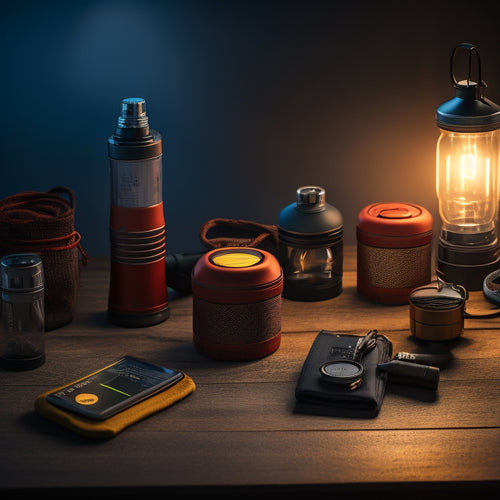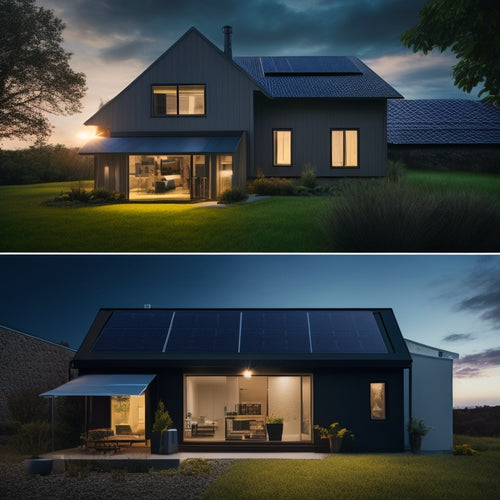
Cost of Solar Panels
Share
You can expect to pay between $2.50 and $3.50 per watt for a solar panel system, with the total cost ranging from $15,000 to $30,000 or more for a typical residential installation, depending on factors such as system size, quality, and installation complexity. A well-designed system can lead to significant long-term savings and increased property value. Understanding your energy needs, system size, and component quality is essential in optimizing your investment. As you consider the cost of solar panels, you'll want to investigate how the right system can be customized to your specific needs, ensuring a seamless shift to renewable energy and maximum return on investment.
The Essentials
- Transitioning to solar can lead to potential zero energy bills, reducing grid reliance and utility costs, and offsetting installation costs through incentives.
- Solar savings help offset installation costs through incentives such as tax credits, leading to long-term financial benefits and reduced energy costs.
- The ideal system size directly affects energy independence and savings, calculated based on current usage and local solar irradiance to minimize costs.
- Oversized systems can lead to unnecessary installation and maintenance costs, while correctly sized systems ensure sufficient electricity generation and reduce reliance on the grid.
- Long-term financial benefits arise from reduced energy costs and insulation from price hikes and energy rate fluctuations, enhancing budget flexibility for other expenses.
Zero Carbon Footprint Guaranteed
You're likely aware that traditional energy sources contribute considerably to carbon emissions, but by switching to solar panels, you'll reduce your carbon footprint and move towards a cleaner, more sustainable future.
By utilizing renewable energy sources, such as solar power systems, you'll not only decrease your reliance on fossil fuels, but also protect yourself from volatile electricity rates, thereby ensuring a considerable return on investment.
This reduction in carbon emissions is an essential step towards mitigating climate change and achieving a zero-carbon footprint.
Carbon Emission Reduction
As the world shifts towards a more sustainable future, reducing carbon emissions has become a pressing concern, with many individuals and businesses seeking to minimize their ecological footprint.
You're likely one of them, and investing in solar panels can be an essential step in achieving this goal. By utilizing renewable energy, you'll greatly decrease your reliance on fossil fuels, resulting in a substantial reduction in carbon emissions.
In fact, residential renewable energy solutions can help homeowners like you access their home's solar power potential and reduce their carbon footprint. Additionally, solar panels can provide energy efficiency and contribute to a cleaner and healthier environment.
The environmental benefits of going solar are undeniable. Not only will you reduce your carbon footprint, but you'll also contribute to a cleaner, healthier environment for future generations.
Furthermore, you'll benefit from solar incentives, such as tax credits and rebates, which can help offset the initial cost of installation. With solar panels, you'll enjoy a cleaner conscience and a lower energy bill, all while doing your part to combat climate change.
Renewable Energy Sources
By employing the power of renewable energy sources, homeowners can drastically minimize their reliance on fossil fuels and make a significant impact on reducing their carbon footprint. Renewable energy sources are becoming increasingly popular as people aim for sustainable living and a zero-carbon footprint. As you consider making the switch, it's important to understand the various options available.
| Renewable Energy Source | Description |
|---|---|
| Solar Energy | Captures energy from the sun's rays to generate electricity |
| Wind Energy | Uses wind turbines to convert wind kinetic energy into electricity |
| Hydro Energy | Exploits the energy of moving water to generate electricity |
| Geothermal Energy | Taps into the Earth's heat to produce electricity |
Increases Property Value Fast
You'll be pleased to know that installing solar panels can greatly enhance your property's sale price and appeal to potential buyers.
With the increasing demand for eco-friendly homes and the importance of renewable energy, solar-powered homes are becoming more desirable.
In fact, studies have shown that solar-equipped homes sell for up to 17% more than their non-solar counterparts.
Boosts Sale Price
A solar-powered home's market appeal receives a significant enhancement, translating to a substantial increase in property value. You can expect a considerable increase in your sale price, making your investment in solar panels a wise financial decision.
According to a study by the National Renewable Energy Laboratory, solar panels can increase your property value by up to $15,000. This significant increase is due to the numerous benefits solar panels provide, including lower energy bills and a reduced carbon footprint.
When calculating the return on investment, consider the installation costs and financing options available. While the initial investment may seem challenging, many financing options, such as solar loans and power purchase agreements, can help spread the cost over time.
Additionally, the increased property value and potential tax incentives can offset the initial investment. By going solar, you're not only reducing your environmental impact but also making a smart financial move that can pay off in the long run.
Adds Market Appeal
Solar panels greatly enhance a property's market appeal, making it more attractive to potential buyers.
You'll find that installing solar panels can considerably increase your property's value, leading to faster sales and higher selling prices. According to recent solar market trends, homes with solar panels sell up to 15% faster than those without. This increased demand is driven by residential buyers seeking energy independence and lower utility bills.
As a homeowner, you'll benefit from the added market appeal that solar panels bring. You'll attract more buyers and set your property apart from others in the neighborhood.
With solar panels, you'll also appeal to environmentally conscious buyers who prioritize sustainability. Furthermore, solar panels can increase your property's value by up to $15,000, making them a smart investment for any homeowner.
In today's competitive real estate market, solar panels are a key differentiator that can give you an edge over other sellers.
Monocrystalline Silicon Cell Efficiency
You're likely aware that monocrystalline silicon cells boast high efficiency ratings, typically ranging from 15% to 20%.
When it comes to residential solar panel efficiency, it's crucial to evaluate the impact of cell temperature on these ratings.
High-performance panels, such as those used in home solar panel systems, can still reduce efficiency by up to 0.5% per degree Celsius.
High Efficiency Ratings
Typically, homeowners and businesses seeking to maximize their energy output opt for high-efficiency solar panels featuring monocrystalline silicon cells.
These high-efficiency ratings are essential in determining the overall performance of your solar panel system. You'll want to take into account the efficiency comparison between different solar technology options.
Monocrystalline silicon cells boast higher efficiency ratings, typically ranging from 20% to 22%, compared to polycrystalline silicon cells, which usually have efficiency ratings between 15% and 18%. This means that for every unit of sunlight that hits the panel, monocrystalline cells can convert more of it into usable electricity.
With high-efficiency solar panels, you can generate more power from a smaller installation, freeing up space on your rooftop or land. This increased energy output also translates to more savings on your electricity bill, giving you greater financial freedom.
When evaluating solar panels, prioritize high-efficiency ratings to maximize your return on investment.
Cell Temperature Impact
Every degree above 25°C (77°F) can reduce the efficiency of monocrystalline silicon cells by around 0.45%. This means that as temperatures rise, your solar panel's cell performance declines.
Temperature effects can lead to significant efficiency loss, resulting in decreased energy output. To alleviate this, you should consider heat management strategies during system optimization. Environmental factors like high ambient temperatures, humidity, and irradiance can all impact panel durability and performance.
When installing your solar panel system, keep in mind installation considerations like roof orientation, shading, and air circulation. These factors can affect heat dissipation and, subsequently, energy output.
Performance monitoring is vital to identify potential issues and optimize your system for maximum energy production. By understanding the cell temperature impact, you can take steps to minimize efficiency loss and guarantee your solar panel system operates at its best.
Wattage for Your Home
You'll need to determine the right system size for your home, as it directly impacts your energy independence and savings.
Calculating your energy needs involves evaluating your current electricity usage, local solar irradiance, and the efficiency of the solar panels you're considering.
With the help of residential solar power systems, you can achieve off-grid energy and reduce your utility bills renewable energy solutions.
System Size Matters
Determining the ideal system size for your home involves calculating your energy needs, which is vital for maximizing the benefits of solar power. A system that's too small won't meet your energy demands, while an oversized system will increase installation costs and maintenance expenses without providing additional energy savings.
When choosing a system size, consider your energy usage patterns, local building codes, and the size of your roof. A larger system may be necessary if you plan to expand your home or add energy-intensive appliances.
You'll also want to weigh the pros and cons of different financing options, government incentives, and warranty considerations. Additionally, consider the environmental impact of your system and how it aligns with your values.
Technology advancements have made it possible to optimize system performance and longevity, but it's essential to balance these benefits with the upfront costs.
Calculating Your Needs
Calculating Your Needs (Wattage for Your Home)
Your energy usage patterns play a significant role in calculating the ideal wattage for your home. This is because different solar panel types have varying energy output capacities. To determine the right size of your solar panel system, you need to calculate your energy consumption.
| Energy Consumption | Recommended System Size |
|---|---|
| Low (0-500 kWh/month) | 2-4 kW |
| Medium (500-1000 kWh/month) | 5-7 kW |
| High (1000-2000 kWh/month) | 8-12 kW |
Consider your daily energy usage habits, including the number of appliances, lighting, and electronics you use. You can review your past electricity bills to get an idea of your energy consumption. Based on this information, you can determine the necessary wattage for your solar panel system. A correctly sized system will guarantee you generate enough electricity to meet your needs, reducing your reliance on the grid and increasing your energy independence.
Lower Operating Costs Guaranteed
As you switch to solar power, you'll start enjoying zero energy bills, freeing up more of your budget for other expenses.
With solar panels, you'll generate your own electricity, reducing your reliance on the grid and, consequently, your utility bills.
This means you'll have more control over your energy costs and a predictable monthly expense.
Zero Energy Bills
By going solar, you can eliminate your energy bills entirely, effectively reducing your operating costs to zero. This means you'll no longer be held hostage by rising energy prices or unpredictable utility bills.
With solar panels, you'll be generating your own clean energy, giving you energy independence and significant solar savings.
As a solar-powered homeowner, you'll enjoy the freedom of not having to worry about energy bills. Imagine the relief of having more money in your pocket each month, money that can be spent on things that truly matter to you.
With solar, you'll be insulated from price hikes and rate changes, giving you a sense of security and stability.
Your solar panels will produce electricity during the day, and any excess energy will be stored in a battery or fed back into the grid.
This means you'll be generating your own power, even when the sun isn't shining. Say goodbye to energy bills and hello to a life of energy independence and financial freedom.
Frequently Asked Questions
Can I Install Solar Panels on My Own?
You can install solar panels on your own, but be cautious: a DIY installation requires careful planning, adherence to safety precautions, and strict compliance with local building codes to guarantee a successful and safe project.
Do Solar Panels Work During a Power Outage?
Did you know that over 70% of solar-powered homes want grid independence? During a power outage, your solar panels won't work unless you have energy storage, like batteries, to store excess energy generated during the day, ensuring you stay powered up.
How Long Do Solar Panels Last on Average?
You're investing in freedom from grid dependence, so you want to know how long your solar panels will last. On average, a solar panel's lifespan is 25-30 years, but with proper maintenance, you can extend it to 40 years or more, ensuring a reliable source of clean energy.
Can I Add More Panels to My Existing System?
You can literally quadruple your existing system's capacity! When expanding your system, you'll need to verify panel compatibility, so you don't void warranties or compromise performance; consult with a pro to guarantee a seamless system expansion that releases your solar freedom.
Are Solar Panels Resistant to Hail and Extreme Weather?
You're right to wonder about solar panels' weather durability - they're designed to withstand harsh conditions, including hail damage, with tempered glass and anodized frames protecting the photovoltaic cells from extreme weather conditions.
Final Thoughts
As you consider investing in solar panels, remember that the benefits are clear-cut: a zero carbon footprint, a significant enhancement to your property value, and a considerable reduction in operating costs. Like a well-oiled machine, monocrystalline silicon cells convert sunlight into energy with extraordinary efficiency. With the right wattage for your home, you'll be saving money in no time. By making the switch to solar, you'll be utilizing the power of the sun to fuel your life, and your wallet will thank you.
Related Posts
-

Best Solar Powered Flashlights for Emergency Situations
When you're choosing the best solar-powered flashlights for emergency situations, focus on their brightness, battery ...
-

High-Efficiency Solar Battery Chargers for Remote Areas
High-efficiency solar battery chargers are essential for your off-grid energy needs in remote areas. They maximize en...
-

Cost of Home Solar Battery
You're looking to invest in a home solar battery to reduce your grid reliance, but you're curious about the cost. The...


